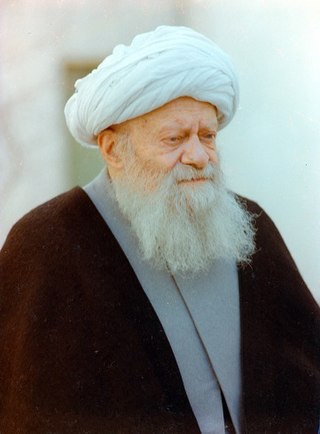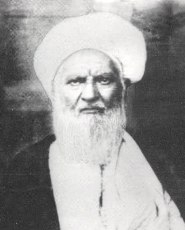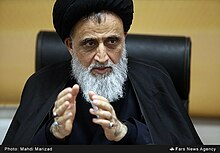
The Expediency Discernment Council of the System is an administrative assembly of Iran appointed by the Supreme Leader and was created upon the revision to the Constitution on 6 February 1988. It was originally set up to resolve differences or conflicts between the Majlis and the Guardian Council,but "its true power lies more in its advisory role to the Supreme Leader." According to Hooman Majd,the Leader "delegated some of his own authority to the council—granting it supervisory powers over all branches of the government" following President Mahmoud Ahmadinejad's election in 2005.

Presidential elections were held in Iran 17 June 2005,with a second round run-off on 24 June. Mohammad Khatami,the outgoing president of Iran,stepped down on 2 August 2005,after serving his maximum two consecutive four-year terms according to the Islamic republic's constitution.

Ebrahim Yazdi was an Iranian politician,pharmacist,and diplomat who served as deputy prime minister and minister of foreign affairs in the interim government of Mehdi Bazargan,until his resignation in November 1979,in protest at the Iran hostage crisis. From 1995 until 2017,he headed the Freedom Movement of Iran. Yazdi was also a trained cancer researcher.

Mohammad Yazdi was an Iranian conservative and principlist cleric who served as the head of Judiciary System of Iran between 1989 and 1999. In 2015,he was elected to lead Iran's Assembly of Experts,defeating Akbar Hashemi Rafsanjani,a former president,by a vote count of 47 to 24.
The Shia clergy are the religious leaders of Shia Islam. Shia Islam places great importance on the guidance of clergy,and each branch of Shi'ism maintains its own clerical structure. The most well-known Shia clergy belongs to the largest branch of Shia Islam,Twelver Shi'ism. As in other branches of Islam,Shia scholars are collectively known as the ulema. Individual clerics are referred to as mullah or ākhūnd,but because those terms have developed "a somewhat pejorative connotation" since at least the 1980s,the term rūḥānī has been "promoted" as an alternative,"especially by the clerical class itself".

The fourth Iranian Assembly of Experts election was held on 15 December 2006. The Assembly of Experts is a Council of 86 mujtahids that elect the Supreme Leader,and oversee his actions. The members of the Assembly are elected every eight years directly by the people of Iran.

Ayatollah Mohammad Momen was a Faqih and a very influential member of the Guardian Council of the Islamic Republic of Iran.

A constitutional referendum was held in Iran on 28 July 1989,alongside presidential elections. Approved by 97.6% of voters,it was the first and so far only time the Constitution of the Islamic Republic of Iran has been amended. It made several changes to articles 5,107,109,111,and added article 176. It eliminated the need for the Supreme Leader (rahbar) of the country to be a marja or chosen by popular acclaim,it eliminated the post of prime minister,and it created a Supreme National Security Council.

Grand Ayatollah Mohammad-Reza Golpaygani was an Iranian Shia and marja' scholar. He was born in 1899 in Gogad village near the city of Golpaygan,Iran. He was taught preliminary studies by his father,Mohammad Bagher. At the age of 9,his father died and he later on moved to Golpaygan to continue his studies. He was one of the highest-ranking Shia clergies to participate in the Iranian Revolution,and a one-time serious contender to succeed Ruhollah Khomeini in the 1989 Iranian Supreme Leader election. However,his candidacy was voted down by the Assembly of Experts,in favor of the eventual successor,Ali Khamenei.

Ayatollah Mirza Hashem Amoli Larijani was an Iranian Shia Marja' and scholar of jurisprudence. Amoli was the father of Ali Larijani,Sadegh Larijani,Mohammad Javad Larijani and Fazel Larijani who have held prominent positions in the government of Islamic Republic of Iran,and Bagher Larijani who is a medical practitioner

Morteza Haeri Yazdi was an Iranian cleric and Twelver Shia scholar. He was the son of Iranian Shia scholar Abdul-Karim Haeri Yazdi,and was one of the students of Ruhollah Khomeini,the former supreme leader of Iran.

Mehdi Shabzendedar Jahromi is an Iranian Shia jurist and member of the Guardian Council."

Grand Ayatollah Hajj Sheikh Abdolkarim Haeri Yazdi was a Twelver Shia Muslim scholar and marja. He was the founder of an important Islamic seminary (hawza) in Qom,Iran. Among his students was Ruhollah Khomeini. His Granddaughter Masoumeh Haeri Yazdi married the eldest son of Ruhollah Khomeini Mostafa Khomeini.

In 2016,the BBC published a report which stated that the administration of United States President Jimmy Carter (1977–1981) had extensive contact with Ayatollah Ruhollah Khomeini and his entourage in the prelude to the Iranian Revolution of 1979. The report was based on "newly declassified US diplomatic cables". According to the report,as mentioned by The Guardian,Khomeini "went to great lengths to ensure the Americans would not jeopardise his plans to return to Iran - and even personally wrote to US officials" and assured them not to worry about their interests in Iran,particularly oil. According to the report,in turn,Carter and his administration helped Khomeini and made sure that the Imperial Iranian army would not launch a military coup.

Seyyed Ahmad Hosseini Khorasani is an Iranian Twelver Shia ayatollah who was born in 1959 Fajr-Abad (Shirvan). He is a member of Guardian Council and also representative of Razavi Khorasan Province people in Assembly of Experts.

Sheikh Ali Akbar Masoudi Khomeini Persian:شیخعلیاکبرمسعودیخمینی,born 1932) is an Iranian ayatollah. He is a member of the Society of Seminary Teachers of Qom,as well as serving as the Trustee for Fatima Masumeh Shrine.















